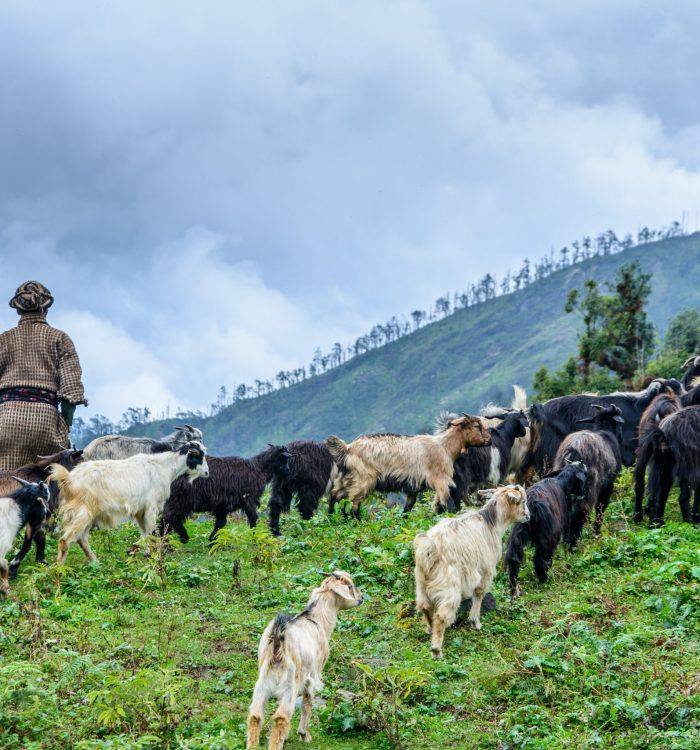Mt. Everest Forest Botanicals Alliance (MEFBA) business incubation provides customised services that range from enterprise organising, capacity building, mentoring, advising and networking to marketing The process is described below.
Participatory Learning and Action (PLA): In areas without identified products, the process starts with a Participatory Learnings and Action workshop. In this process, the community assesses its livelihoods needs and identifies and selects their enterprise focus based on sustainability of resources, market opportunities and feasibility.
Community enterprise organising: In this next step, EDOs facilitate discussions and consultation to enable the community to come together and decide to work as one enterprise. This step includes identifying roles and responsibilities, and policy and systems development. Initial steps also include value chain analysis and strategy development. Sensitising and discussion on the Issues of social inclusion, women’s rights and empowerment and human rights are embedded into the SME action plan of the community. Pressing issues of climate change and its effect on the livelihoods of the community and the need for the mitigation and adaptation are seriously discussed and incorporated into the project DNA for achieving the Goal 13 of SDG.
Production technology upgrading: Starting from what the community producers already know, which is production, EDOs introduce new inputs to either improve product quality or develop new products to make them more acceptable to the market. Starting with something that they are familiar with helps ease the community producers into the complex process of enterprise development. This service also includes ‘greening’ enterprises. For enterprises working on Essential Oil Mefba promotes the principles of sustainability of wildcrafting the forest botanicals and encourages to go for kitchen garden nursery for eventual plantations of high value botanicals for therapeutic and lifestyle products in their land holdings. For textiles, Mt. Everest Forest Botanicals Alliance (MEFBA) promotes the use of natural vegetable dyes and natural fibres. Together with the community, Mt. Everest Forest Botanicals Alliance (MEFBA) develops protocols and standards not just for quality improvement, but also for sustainable or green production. The traditional community knowledge of handling soapnuts, chiuri tree, MAP, plant fibres are structured and protocols developed for posterity as the traditional collective communal memory heritage in the form of oral traditions are fast disappearing.
Assistance in sales of products: The organisation ensures that from the onset, the support team tries to find buyers for existing community products, as they develop the enterprise. This is part of the strategy to keep the producers interested in the business incubation process. They have income needs and this cannot stop while they establish their enterprise.
Capacity building for enterprise management is composed of training, mentoring and coaching. Training modules include operations management, financial management – bookkeeping, accounting, marketing – and production management. Trainings are usually adapted to community participants, who are mostly without business experience and have limited literacy. Trainings are very interactive and experiential. Methods include games, producer visits and film screenings. In Sustainable Community Enterprise Development (SCED), actual case studies from participants are used during the training for a more hands – on and practical approach. Activities are also usually done in local languages and dialects or are multilingual. The organisation makes an effort not to make language a barrier to learning. Mentoring and coaching are important to the actual implementation of the lessons learnt. Enterprise development officers work alongside community enterprises to carry out activities like bookkeeping, production management and sales. The presence of the MEFBA team member in the community during the development period encourages the community to continue as they know they are not alone in this activity.
Marketing is one of the most important services provided by the organisation. The geographical location of the clients is a big hindrance to them engaging with the market directly. Marketing includes product development, promotion, communication and sales. When the organisation started, there were limited markets for community products, and markets were monopolised by a few actors. Community producers also lacked any knowledge of marketing strategies, which also limited the market reach of products, hence restricting demand. This led the organisation to incubate marketing intermediaries to provide a fair opportunity but also to find new markets for community products. The marketing (green) intermediaries now lead in the research and development (R&D) of new products from the communities and cultivation of new markets. For example, handwoven hemp yarns are knitted to produce fashionable dresses for the tourist market in Kathmandu as souvenirs. Further, traditional chiuri butter is redeveloped as a substitute for shea butter in niche artisanal cosmetics production in Kathmandu by AGP Natural Exotics, the green intermediary of Mt. Everest Forest Botanicals Alliance (MEFBA). Moving beyond tourist markets, these traditional knitwears and natural skincare products have found a new exports market in fashion.
Services also go beyond actual market linking or sales to market and industry-development efforts. These aim to increase the value of NTFPs and cultural products and advocate for the development of these industries. Strategies include cooperative formation, branding, standard development, certification development and consumer engagement and education.

